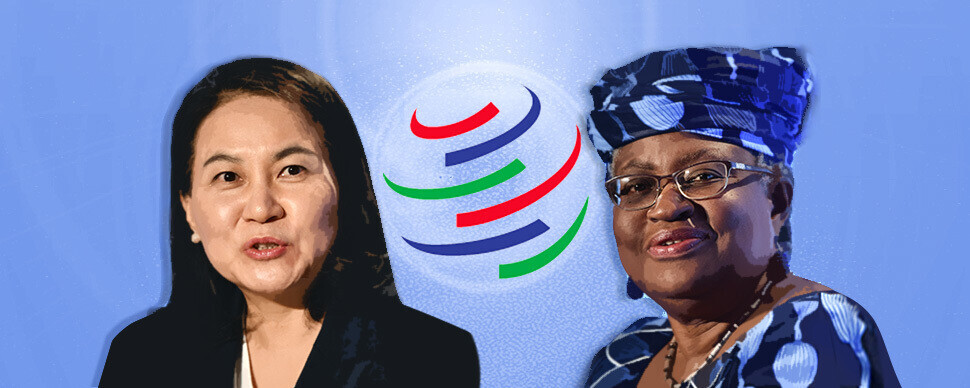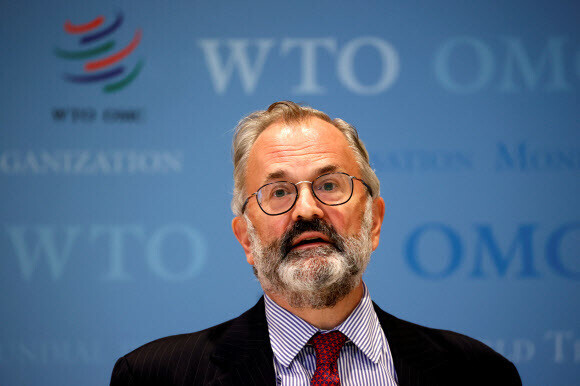hankyoreh
Links to other country sites 다른 나라 사이트 링크
[News analysis] US-China proxy war may be behind WTO director-general race

A dispute over who will become the next director-general of the World Trade Organization is part of a proxy war between the US and China, some experts believe. Considering that the final round of the election pits South Korean Trade Minister Yoo Myung-hee against former Nigerian Finance Minister Ngozi Okonjo-Iweala, experts say the US is adamantly opposed to the selection of a candidate from Africa, where China has gradually been increasing its sway.
The director-general selection process had apparently been going smoothly until Oct. 28, when it was abruptly thrown into chaos. That was when WTO General Council Chair David Walker announced that Okonjo-Iweala had the broad backing of member states and that the council recommended she be named the next WTO director-general in a term that would last through August 2024. Given precedent in the WTO, established in 1995, that announcement should have been the final word in the selection process.
But there was a single country opposed to the decision, the world’s most powerful country, the US.
WTO Spokesman Keith Rockwell left no doubt about his irritation, remarking that 27 national delegations had presented at the meeting, with the US being the only delegation that said it would not support Okonjo-Iweala’s candidacy and would continue to back Yoo. Rockwell essentially accused the US of preventing WTO members from reaching consensus.
The Wall Street Journal (WSJ) reported on Oct. 29 that American objection to Okonjo-Iweala “prompted an uproar from the delegates of more than two dozen governments [including] European allies, China, Canada, Latin American, and African states.”
“An EU representative complained that if the US had issues with the process, it could and should have raised them far earlier,” the WSJ said.
But the US hasn’t backed down. The US Trade Representative even went so far as to issue a statement arguing that Yoo is the right person for the job and needs to be named director-general if the WTO is to carry out “major reform.”
Why is the US going to such great lengths to install Yoo? The ostensible reason offered by the US is that Okonjo-Iweala, as a former finance minister, doesn’t have much experience in the area of trade.
“A senior US official said the US had opposed Ms. Okonjo-Iweala’s candidacy because she had no background in trade, having spent most of her career at the World Bank,” the WSJ explained. The US argues that Yoo, given her 25 years of extensive experience in the area of trade, is a better fit for the job.
But the US appears to have ulterior motivations. The Trump administration has flexed its muscles against the WTO on several occasions, griping that the body is “unfair” to the US.
For example, the US has repeatedly blocked the appointment of new members to the WTO’s Appellate Body, the organization’s final court of appeal, whenever one of the current member’s terms has expired. As a result, the seven-person body had to suspend operations on Dec. 11, because it could no longer field the three-person quorum necessary to convene.
“US officials have said the WTO needs a major overhaul to challenge what Western countries say is unfair competition from China’s market-distorting state capitalism system,” wrote the WSJ, explaining the US’ current position on the WTO.
The US has basically concluded that Yoo, a trade expert from an American ally, would be better for leading an overhaul at the WTO than Okonjo-Iweala, who would be susceptible to Chinese influence.

The Nikkei said in its Oct. 30 edition that the US opposes Okonjo-Iweala because of China’s support. The US objects to the trade benefits that China receives given its developing country status at the WTO, the Japanese newspaper said. The US is concerned that the appointment of an African as director-general could produce trade policies that are more favorable to developing countries.
The big question is what happens next. The WTO is supposed to make its final decision about its next director-general in a General Council meeting on Nov. 9. But given WTO precedent of choosing directors-generals with the unanimous consensus of the 164 member states, continuing American opposition would likely prevent that decision from being made.
The probability of a compromise that would give three-year terms to both candidatesThe WTO has hinted that, under those circumstances, it would hold a vote to decide the next director-general, which is allowed in the rules, but it’s unclear whether the WTO would actually opt for that course of action. Some foreign newspapers have even suggested that, if the standoff continues, a compromise plan could emerge that would allow both Okonjo-Iweala and Yoo to serve three-year terms, in a manner similar to what happened in the 1999 selection process.
At the moment, two variables are still in play. The first is the outcome of the US presidential election, scheduled for Nov. 3. The defeat of Donald Trump, who has clashed with the WTO under his vision of “America first,” and the victory of Joe Biden, who emphasizes alliances and harmony, could change the US’ calculus.
S. Korea adopts wait-and-see approachThe second variable is South Korea’s response. On Oct. 29, immediately after the WTO’s decision was reported, South Korea’s Ministry of Trade, Industry, and Energy (MOTIE) and Ministry of Foreign Affairs (MOFA), the relevant ministries, settled on having Yoo make an honorable withdrawal from the race. But the Blue House has reportedly postponed that decision, adopting a wait-and-see stance.
The Blue House is reluctant to immediately admit defeat, given President Moon Jae-in’s aggressive lobbying on Yoo’s behalf. A MOFA official told reporters on Oct. 30 that the government was considering what to do, taking the overall situation into account.
In the end, the South Korean government is likely to wait for the outcome of the US presidential election and subsequent action by the Americans despite disapproval from other countries. There’s still a chance that the selection process could end in a draw, as in 1999.
Given that possibility, the Nikkei article noted that if the process ends with Yoo and Okonjo-Iweala both receiving three-year terms, just as in 1999, South Korea would have ample reason to proclaim a come-from-behind victory.
By Gil Yun-hyung, staff reporter
Please direct comments or questions to english@hani.co.kr]

Editorial・opinion
![[Editorial] Intensifying US-China rivalry means Seoul must address uncertainty with Beijing sooner than later [Editorial] Intensifying US-China rivalry means Seoul must address uncertainty with Beijing sooner than later](https://flexible.img.hani.co.kr/flexible/normal/500/300/imgdb/original/2024/0517/8117159322045222.jpg) [Editorial] Intensifying US-China rivalry means Seoul must address uncertainty with Beijing sooner than later
[Editorial] Intensifying US-China rivalry means Seoul must address uncertainty with Beijing sooner than later![[Column] When ‘fairness’ means hate and violence [Column] When ‘fairness’ means hate and violence](https://flexible.img.hani.co.kr/flexible/normal/500/300/imgdb/original/2024/0516/7417158465908824.jpg) [Column] When ‘fairness’ means hate and violence
[Column] When ‘fairness’ means hate and violence- [Editorial] Yoon must stop abusing authority to shield himself from investigation
- [Column] US troop withdrawal from Korea could be the Acheson Line all over
- [Column] How to win back readers who’ve turned to YouTube for news
- [Column] Welcome to the president’s pity party
- [Editorial] Korea must respond firmly to Japan’s attempt to usurp Line
- [Editorial] Transfers of prosecutors investigating Korea’s first lady send chilling message
- [Column] Will Seoul’s ties with Moscow really recover on their own?
- [Column] Samsung’s ‘lost decade’ and Lee Jae-yong’s mismatched chopsticks
Most viewed articles
- 1[Editorial] Transfers of prosecutors investigating Korea’s first lady send chilling message
- 2[Exclusive] Unearthed memo suggests Gwangju Uprising missing may have been cremated
- 3[Column] US troop withdrawal from Korea could be the Acheson Line all over
- 4‘Shot, stabbed, piled on a truck’: Mystery of missing dead at Gwangju Prison
- 5S. Korea “monitoring developments” after report of secret Chinese police station in Seoul
- 6[Column] When ‘fairness’ means hate and violence
- 7[Editorial] Intensifying US-China rivalry means Seoul must address uncertainty with Beijing sooner t
- 8US has always pulled troops from Korea unilaterally — is Yoon prepared for it to happen again?
- 9[Column] How to win back readers who’ve turned to YouTube for news
- 10Xi, Putin ‘oppose acts of military intimidation’ against N. Korea by US in joint statement